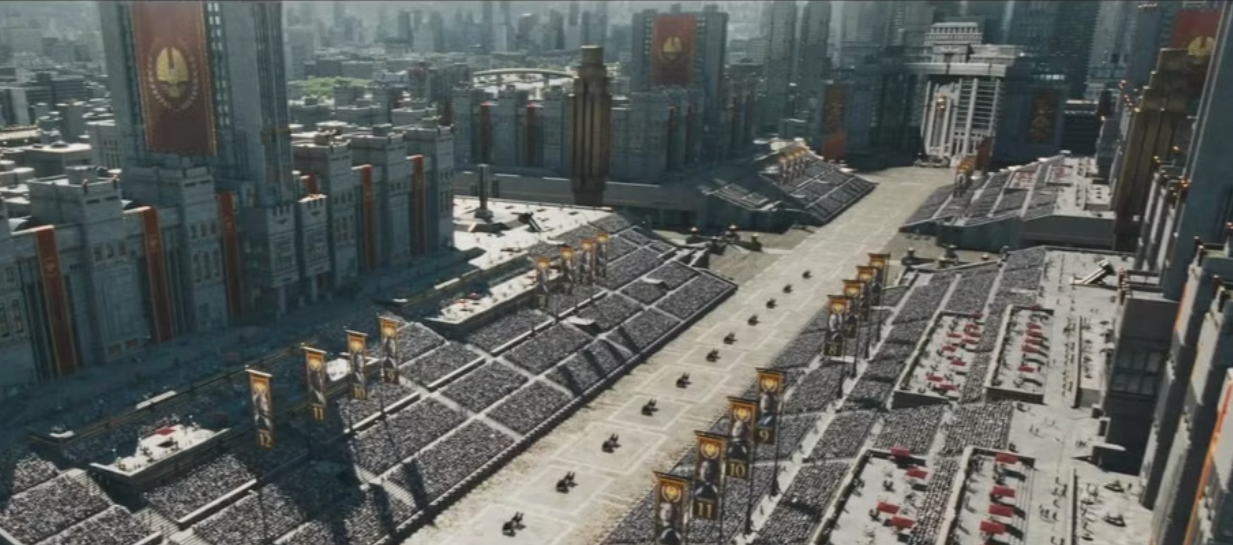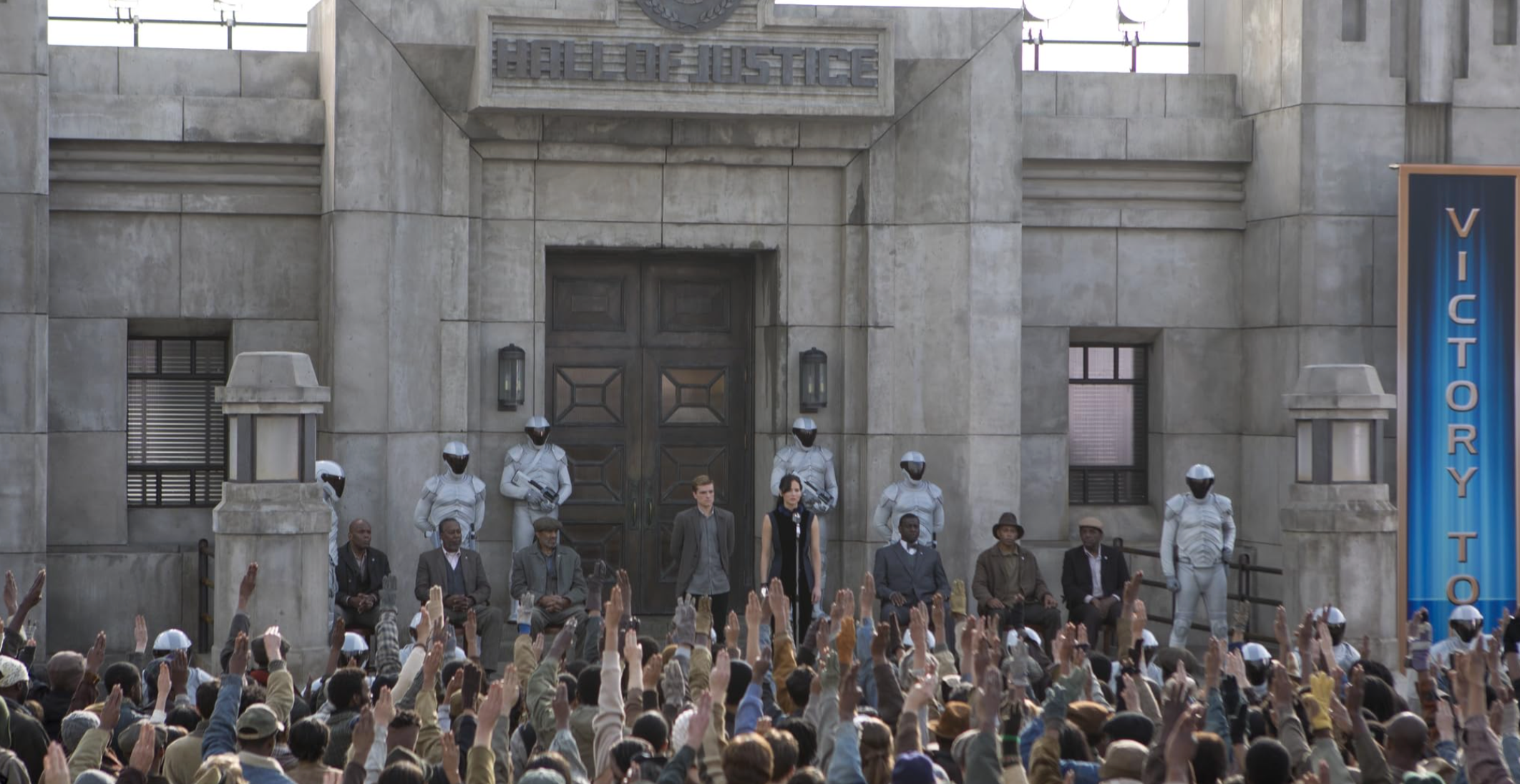
Written by Jessica Woodyatt
Why I Love The Hunger Games
and the Lessons I Carry into Law
As a popular book and movie series, The Hunger Games taught me a lot throughout my formative years. I first read The Hunger Games when I was ten. Rather young, I know! But I picked up almost anything that was fiction as long as it had a promising premise with root-able characters.
Back when I read it, most of my thoughts centred around which characters would make it ‘unscathed’ at the end of the story, and if there was a happy ending. But now, with more legal knowledge and slightly more world experience under my belt, I couldn’t ignore the loud warning signs if I tried: What would our society look like if law becomes a tool of manipulation instead of a safeguard to justice for all?
A wide view of the Capitol’s grand plaza leading to President Snow’s mansion during the opening ceremony of the 75th Hunger Games, showcasing its oppressive power and spectacle. Image from The Hunger Games: Catching Fire (2013), directed by Francis Lawrence.
Studying Foundations of Law, Public Law and Statutory Interpretation, Constitutional Law and even Administrative Law in Monash University, the rule of law has been repeatedly hammered into our brains. We know a separation of powers are essential to holding those in control to account. Fairness, equality and access are also three key concepts that we have seen permeate in VCE Legal Studies. In law, we need to uphold these ideals so that our institutions and judicial system remains independent, trustworthy, and capable of delivering justice to all.
The Hunger Games shows what happens when these principles are abandoned. The Capitol writes the laws to suit itself, and breaks them whenever it wants. There is no empathy to those they deem ‘other’. To those they see as criminals. To those who are pitiful, but also animalistic. The annual Hunger Games serves as an effective marketing tool for the Capitol’s propaganda, allowing them to spin a single narrative of exacting justice to the twelve Districts. By decrying the districts as public enemies of the state, brutal ‘punishment’ is not only legal, but justified against their own citizens. Their violence becomes legitimate and normalised.
At the end of the trilogy, the Capitol falls. But the revolution risks becoming just as oppressive as the regime it overthrows. Coin’s proposal for a new Hunger Games using the Capitol’s children is proof that removing a bad system doesn’t automatically create a good one. In the legal world, this speaks to the danger of reform for reform’s sake. Changing a law, replacing a court, or even drafting a new constitution doesn’t mean justice will automatically follow. Real change requires careful design, checks and balances, and a commitment to values that protect everyone, not just the new winners. I think Australia understands this very well. As seen by the 2023 referendum, there are situations where it is crucial to provide detailed information and practical solutions to the public before new change can occur.
A moment of defiance in front of District 11’s Justice Building as the citizens raise the three-finger salute not only as a symbol of respect, but of rebellion. Image from The Hunger Games: Catching Fire (2013), directed by Francis Lawrence.
What drew me to law was knowing that legal reasoning was not always about finding the right answer. Sometimes there is no ‘right’ answer. Most of the time, dissent is crucial. Strangely enough, one of the clearest illustrations of this significance comes from The Hunger Games. In Panem, voices that challenge the official narrative are silenced.
As a law student, that’s the complete opposite of what I’ve come to value. Disagreement sharpens reasoning, reveals blind spots, and allows for alternative interpretations and options for improvements. Justice Michael Kirby is an obvious example of this. Admittedly it can take some time to get comfortable with discourse. However, it can keep the legal conversation alive. It could also be an antidote to the similar kinds of rigid, unchallengeable “truth” enforced in The Hunger Games.
The same openness we need for differing legal opinions is also crucial in how we view people themselves. Throughout the first book, Cato (the brutal Career tribute from District Two), along with many other tributes are depicted as the enemy. As the ‘bad guys’. In law, this categorisation matters. If we group people solely by their category from a ‘dangerous criminal’ to a ‘desperate plaintiff’ to a ‘vexatious litigant’, we run the risk of not seeing them as individuals with their own stories, pressures, and capacities for change. Dismissing everyone from the ‘other side’ as irredeemable is exactly the thinking that leads to entrenched injustice. Seeing nuance, on the other hand, creates space for rehabilitation, restorative justice, and fairer outcomes. Law should deal with people as they are, not as stereotypes, and we as lawyers should try to do so as well.
A display of confidence and unity by the Career tributes from Districts One and Two during training, embodying the Capitol’s culture of strength and dominance in the arena against the weaker districts. Image from The Hunger Games (2012), directed by Gary Ross.
So what would our society look like if law becomes a tool of manipulation instead of a safeguard to justice for all? It could become a place of chaos. It could become a society absent of empathy. It could prevent us from feeling safe. The Hunger Games is not the only piece of literature and media that cautions a society without proper judicial systems, and others shed light on other subtle ways our governments are no longer for the people. That’s exactly why stories like this matter. They remind us what’s at stake. Nevertheless, if you missed The Hunger Games hype and haven’t read it yet, regardless of your age or occupation, I would definitely recommend!




